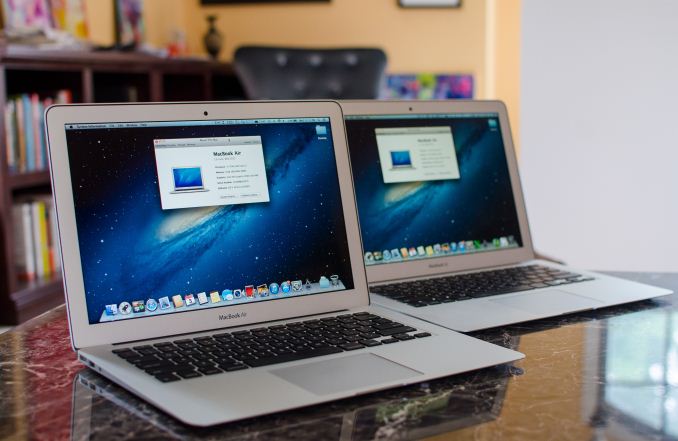The 2013 MacBook Air: Core i5-4250U vs. Core i7-4650U
by Anand Lal Shimpi on July 4, 2013 8:00 AM ESTFinal Words
Simplicity permeates Apple from design and software all the way down to the purchasing experience. The 2013 MacBook Air offers only two choices of CPUs, and honestly for the vast majority of the population, that's all you really need. The default Core i5 1.3GHz (4250U) delivers the best overall battery life regardless of workload. Its performance is often somewhere in between a 2011 and 2012 MacBook Air depending on workload, although in some cases it's possible to see equivalent performance to an upgraded 2012 MBA. If you need more performance however, the 1.7GHz Core i7 upgrade (4650U) delivers. In most situations you get more than a 20% increase in performance, bringing the platform up to somewhere in between last year's 1.7GHz Core i5 and 2.0GHz Core i7 options. Once again, with the right workload you could even see performance as much as 20% better than a 2GHz Core i7 from last year. Although I didn't publish any results here, GPU performance seemed roughly unchanged compared to the Core i5 option.
The tradeoff in battery life is pretty easy to understand. In mostly idle workloads, I wouldn't expect any real degradation in battery life compared to the Core i5. Both configurations are equally capable of hitting the same max battery life number. More active workloads however will likely show a 15 - 20% decrease in battery life when paired with the faster CPU. It's possible that you'll see a larger drop with a very aggressive CPU-bound usage model, but at that point I'd assume that you'll probably want to be plugged in regardless of what system you're using.
In previous MacBook Airs, the choice of what CPU to buy was almost always a difficult one. Do you opt for the in-between upgrade or go all the way to the top? With this year's model, the decision is greatly simplified. If you want ultimate battery life regardless of usage model, stick with the base Core i5. If you need performance, the Core i7 upgrade is absolutely worth it. My personal choice would be for the Core i5, but that's because I tend to fall on the battery life side of of the battery life vs. performance fence when it comes to the MacBook Air. If the MacBook Air is going to be your only machine however, I can definitely make a case for opting for more performance.











127 Comments
View All Comments
Paapaa125 - Thursday, July 4, 2013 - link
You lack one kind of test:Test light/medium workload BUT equal the amount of work the units do. For example encode 2 hours of movies, reload the webpage 200 times and see the result. The workload is identical (i7 does it faster) and how does it affect the battery life?
Of course i7 uses more juice in heavy workload but it also accomplishes more. This is not necessarily fair.
lukarak - Thursday, July 4, 2013 - link
"What's important to note about all of these tests is that the amount of work done per cycle of the test doesn't vary based on performance. There's enough idle time baked in to make sure that the Core i7 based 13-inch MBA isn't artifically penalized by having to do more work than the i5 model simply because it's faster. "You obviously missed this?
Paapaa125 - Thursday, July 4, 2013 - link
Yes, I missed that. Very important correction, thanks! So i5 does more with the same battery life, just slower.ananduser - Thursday, July 4, 2013 - link
It doesn't do more. It does the same only slower. The i7 finishes the job faster and you pay a battery penalty for that, obviously.Paapaa125 - Friday, July 5, 2013 - link
Ok, let's sort this out. I was under impression that both computer do the same amount of work in same time? So if both ran a test for one hour, they accomplished the same thing?And as i5 can last longer than i7 in heavy load, it also can do more work, right?
ananduser - Friday, July 5, 2013 - link
Both kits are tested with the same amount of work. The i7 draws more power obviously but it also finishes its tasks faster than the i5. The i5 lasts longer but it also takes longer to finish the heavy load because it is slower.wallysb01 - Saturday, July 6, 2013 - link
Which shouldn't be too surprising, speed increases per Watt are not linear. I would have guessed in the sub 2.0GHz base clock rate range that it might be closer to linear than this showed though.Sugardaddy - Thursday, July 4, 2013 - link
That was a very good and informative article, thank you! Now if only we could get a review of the 28W Haswell chips!dineshramdin - Thursday, July 4, 2013 - link
It costs me around 140 bucks to upgrade my Core i7 CPU, which was pretty reasonable. However, i7-4650U includes a 8GB memory and the other one got one of 4GB, I guessAbelard - Thursday, July 4, 2013 - link
Those battery life figures are eye-poppingly good.